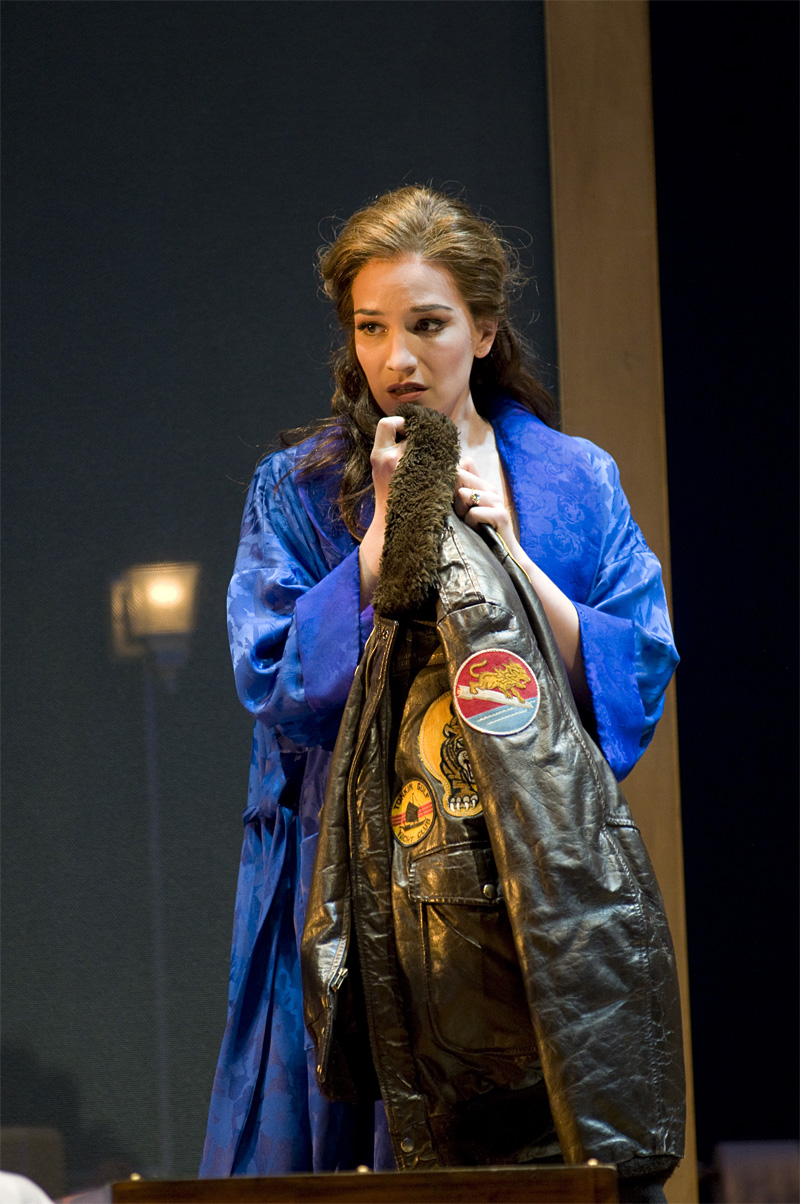From the first scene of Amelia, premiered by Seattle Opera and enthusiastically received last Saturday night, librettist Gardner McFall stakes out new territory for opera—not only in subject matter (the scarring legacy of the Vietnam War) but in stagecraft. Through dreams, reminiscences, and hallucinations, sometimes one within another, McFall collapses time and compresses a wide-ranging story into a tight, beautifully organized two acts, which composer Daron Hagen brings in at an hour each.
Having several characters at once voice their thoughts directly to the audience is a common operatic convention. But Amelia expands the device by having characters from different points in time sing concurrently. As the curtain rises, the young title character (Ashley Emerson) fantasizes about flight just before her father Dodge (William Burden) departs for Vietnam. As he readies her for bed, her mother (Luretta Bybee), in a flash-forward, receives word that his plane went down; and as Amelia sleeps, her namesake, aviator Amelia Earhart (Jennifer Zetlan), sings from her cockpit, suspended overhead, before her own fatal crash.
The next scene introduces not only the grown, pregnant Amelia (Kate Lindsey) and her husband, Paul (Nathan Gunn/David McFerrin), but the mythical Icarus (Nicholas Coppolo), both a pioneer of flight and its first victim. Then it’s back to 1985, as Amelia and her mother visit Vietnam seeking the truth about Dodge’s disappearance, a tale told in a re-enactment that includes an onstage shooting as harrowing as Eddie Adams’ iconic wartime photo of a point-blank execution. Act 2 opens with Amelia still grieving for her father and confronting her engineer husband about his work. When she learns his secret project is a bomber, the news triggers a breakdown (Lindsey’s Oscar-clip moment, played convincingly) and a coma which threatens her baby.
From here, Amelia becomes a tense hospital drama (a milieu that as far as I know has been totally untouched by opera). Amelia’s aunt Helen (SO favorite Jane Eaglen) arrives to dispense wisdom, and both Dodge and Earhart reappear. In the next bed is the young man who played Icarus in Act 1; his subplot ends in a tragic counterpoint to the birth of Amelia’s child.
Complex as this story’s leaps and foldings might seem in outline, director Stephen Wadsworth, veteran of SO productions from Handel to Wagner’s Ring, stages it all with unerring clarity. There’s no clutter, either, in Thomas Lynch’s set—rectilinear and airy, with flying panels and light-diffusing scrims providing visual order with minimum fuss.
From the start of this commissioning project in 2002, Seattle Opera general manager Speight Jenkins wanted the new opera’s story to be both contemporary and American. Hagen, whose operatic track record includes a well-received Shining Brow (1993) based on the life of Frank Lloyd Wright, was the first contributor chosen, and he brought on McFall, who lost her own father in Vietnam (and who quotes a letter from him in an aria for Paul). As flexible as McFall is in her approach to storytelling, so is Hagen sensitive and shrewd in his musical methods, making Amelia’s breakdown scene, for example, entirely a cappella—she’s sonically alone. Where singing might seem incongruous, as amid shouting and gunfire in the flashback combat scene, Hagen opts for spoken dialogue.
If Hagen’s vocal lines don’t often take on immediately memorable shapes, they arch and flow gratefully. Even in accompaniment passages, Hagen makes sure plenty of interest happens in the pit, and his orchestration—rich with percussion that adds both rhythmic point and expressive intensity—is always transparent; you can hear everything that’s going on. He has a particular flair for passages of floating, atmospheric delicacy.
During the scene-change music, he lets the orchestra loose. It’d be great to hear these vivid entr’actes extracted as a concert suite; their sweep and lush energy is meat-and-potatoes for conductor Gerard Schwarz. Harmonically, Amelia‘s music is never too harsh, in the audience-scaring sense, nor ever bland; Hagen’s main musical ancestors seem to be his teacher, Ned Rorem, and Samuel Barber. Only in the brutal Vietnam scene does the music feel timid, falling short of the level of onstage impact.
The most striking passage in Hagen’s score is the final scene—the splashy, thrilling orchestral chaos leading to the baby’s birth; the choral outburst for nearly the whole cast (also a cappella) heralding its arrival; and the long, serene afterglow. From the joyous vocal wall of sound, tendrils of melodic line break off and float away on their own, from Amelia and her family, from the doctors and nurses in scrubs dispersing across the stage. Gradually the orchestra steals back in—just wisps of sound to bring down the curtain, echoing the stars coming out overhead, in a reprise of the contemplative atmosphere with which the opera began.







